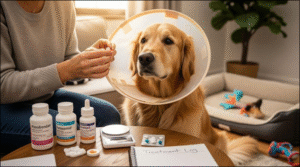Why Do Golden Retrievers Get Cancer? Understanding the Risk

Golden retrievers are beloved family companions known for their gentle nature and loyalty, but they face a sobering reality: they have one of the highest cancer rates among all dog breeds. Understanding why do golden retrievers get cancer is crucial for pet owners who want to protect their furry friends and make informed decisions about their care.
Table of Contents
The Alarming Statistics Behind Golden Retriever Cancer
The numbers surrounding golden retriever cancer are staggering and paint a concerning picture for this popular breed. Research shows they have up to a 65% chance of dying from cancer, making it the leading cause of death in the breed. Based on necropsy findings, 445 of the 652 (68.3%) GR undergoing necropsy examination were diagnosed with some form of cancer and 424 of the 652 (65.0%) GR were determined to have died or have been euthanized because of cancer.
The Golden Retriever Lifetime Study, a groundbreaking research project, has provided invaluable insights into why do golden retrievers get cancer at such alarming rates. The Lifetime Study has enrolled over 3,000 dogs, and reports that 60% are affected by cancer. This extensive research has tracked thousands of dogs throughout their lives, collecting data that helps scientists understand the complex factors contributing to cancer development.
As veterinary oncologist Dr. Robert Rebhun notes, “If we can find a biomarker that’s predictive of cancer, we could intervene earlier”, highlighting the importance of understanding why do golden retrievers get cancer to develop better prevention strategies.
Genetic Predisposition: The Primary Factor
Inherited Genetic Mutations
The primary reason why do golden retrievers get cancer lies in their genetic makeup. Certain breeds have a higher predisposition to specific types of cancer due to inherited genetic mutations. Golden retrievers have been selectively bred for specific traits, which has unfortunately concentrated certain genetic variations that increase cancer susceptibility.
Recent research has identified specific genetic factors that influence cancer risk and longevity in golden retrievers. Researchers discovered that a variant in a noncoding region of the ERBB4 gene (also known as HER4) grants golden retrievers an extra 2 years of life on average. This discovery provides hope for understanding why some golden retrievers live longer despite the breed’s overall cancer predisposition.
Shared Genetic Risk Factors
Scientists have discovered that multiple cancer types in golden retrievers share common genetic risk factors. By doing genome-wide association, we identified loci predisposing to hemangiosarcoma and B-cell lymphoma. To our surprise, we found two shared loci predisposing to both diseases. This finding helps explain why do golden retrievers get cancer across multiple organ systems and cancer types.
The genetic component answers a significant part of why do golden retrievers get cancer, but it’s not the complete picture. Understanding these genetic predispositions allows breeders to make more informed breeding decisions and helps veterinarians develop targeted screening protocols.
Environmental Factors Contributing to Cancer Risk
Chemical Exposures and Toxins
Environmental factors play a crucial role in explaining why do golden retrievers get cancer. Exposure to environmental contaminants like cigarette smoke, asbestos, pesticides, herbicides, and other toxins can increase the risk of cancer in dogs. Modern golden retrievers are exposed to numerous environmental toxins that their ancestors never encountered.
Environmental exposures such as PFAS chemicals in water could appear sooner due to dogs’ shorter lifespans than humans. These “forever chemicals” and other environmental pollutants may contribute significantly to why do golden retrievers get cancer at such high rates.
Lifestyle and Exercise Patterns
Interestingly, exercise patterns and lifestyle factors also influence cancer risk in golden retrievers. The frequency, pace, and duration of exercise, combined with exercise-related environmental factors over time, are strong predictors of cancer development in Golden Retrievers, suggesting that cumulative lifestyle exposures over time may play a critical role in cancer development.
This research suggests that the answer to why do golden retrievers get cancer isn’t just genetic but involves complex interactions between genes and environment over time.
The Most Common Cancer Types in Golden Retrievers
Hemangiosarcoma: The Silent Killer
Hemangiosarcoma is one of the most aggressive cancers affecting golden retrievers and contributes significantly to why do golden retrievers get cancer mortality rates. This cancer affects blood vessels and often goes undetected until it’s advanced, making it particularly deadly for the breed.
Lymphoma: The Second Most Common
Lymphoma is the second most common cancer affecting Golden Retrievers and is hypothesized to arise through a complex interaction of genetic and environmental factors. This blood cancer demonstrates the multifactorial nature of why do golden retrievers get cancer.
Osteosarcoma and Mast Cell Tumors
Golden retrievers also show increased susceptibility to bone cancers and skin tumors. As of March 1, 2024, 46 dogs in the Study have been diagnosed with histiocytic sarcoma, showing the ongoing impact of various cancer types on the breed.
Risk Factors Beyond Genetics
Age and Hormonal Factors
Age remains a significant factor in why do golden retrievers get cancer. Along with age, genetics, and environmental factors, there are additional risk factors that can contribute to cancer development in golden retrievers. These include obesity, hormonal imbalances, immune system deficiencies, and previous exposure to radiation or chemotherapy.
HER4 has been shown to interact with hormones such as estrogen and may also play a role in processing environmental toxins, suggesting that hormonal factors may partially explain why do golden retrievers get cancer at different rates between males and females.
Immune System Function
A compromised immune system can contribute to why do golden retrievers get cancer. When the immune system fails to detect and eliminate abnormal cells effectively, cancerous growths can develop and spread throughout the body.
The Role of Breeding Practices
Modern breeding practices have inadvertently concentrated cancer-causing genes in golden retrievers. The popularity of the breed has led to extensive line breeding and the use of popular sires, which has reduced genetic diversity and increased the prevalence of cancer-associated genes.
Understanding why do golden retrievers get cancer has led to calls for more responsible breeding practices, including genetic testing and careful selection of breeding pairs to reduce cancer risk in future generations.
Prevention and Early Detection Strategies
Regular Veterinary Monitoring
While genetics largely determine why do golden retrievers get cancer, early detection can significantly improve outcomes. Regular veterinary examinations, blood work, and imaging studies can help identify cancer in its early stages when treatment is most effective.
Environmental Management
Pet owners can reduce some environmental factors that contribute to why do golden retrievers get cancer by limiting exposure to known carcinogens, providing clean water, avoiding pesticides and herbicides, and maintaining a healthy indoor environment.
Nutritional Support
Proper nutrition may help support the immune system and potentially reduce cancer risk, though it cannot overcome the genetic predisposition that explains why do golden retrievers get cancer.
The Future of Golden Retriever Cancer Research
The ongoing Golden Retriever Lifetime Study continues to provide valuable insights into why do golden retrievers get cancer. A total of 3,044 United States Golden Retrievers aged 6 months to 2 years completed baseline enrollment from June 2012 to April 2015. As of May 31, 2021, 2,251 dogs remain engaged in the study.
This long-term research is helping scientists develop better strategies for preventing and treating cancer in golden retrievers. As one researcher noted, “The defective signal may hide in abnormal genes inherited from parents, or germinate when normal genes are exposed to harmful environmental influences”, emphasizing the complex nature of cancer development.
For more comprehensive pet care information and guidance on various dog breeds, visit Golden Retriever Guides for expert resources and advice.
Conclusion
Understanding why do golden retrievers get cancer requires recognizing the complex interplay between genetics, environmental factors, and lifestyle influences. While the breed’s genetic predisposition cannot be changed, awareness of these risk factors allows pet owners to make informed decisions about breeding, environmental management, and veterinary care.
The high cancer rates in golden retrievers serve as both a challenge and an opportunity for advancing veterinary oncology research. Through continued study and improved breeding practices, there’s hope for reducing the cancer burden in future generations of golden retrievers.
For the latest research and treatment options, consult resources like the National Cancer Institute to stay informed about advances in cancer research that may benefit both human and veterinary medicine.
As we continue to unravel the mysteries of why do golden retrievers get cancer, one question remains paramount for every golden retriever owner: how can we use this knowledge to give our beloved companions the longest, healthiest lives possible?






